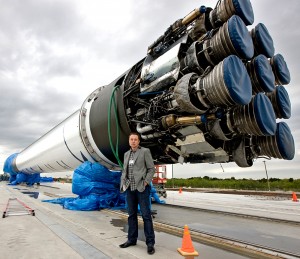 Ever since I was a little boy, I wanted to build a space company. My mother was an applied mathematician whose PhD was focused on solar energy collection for spacecraft, and who worked on the Soviet space programme at a time when space travel was close to science fiction. I didn’t realise it at the time, but that had a subconscious effect on my own passions and ambitions, and together with her relentless motivation, it led to my inability to be interested in setting and achieving goals which were not of a truly grand nature.
Ever since I was a little boy, I wanted to build a space company. My mother was an applied mathematician whose PhD was focused on solar energy collection for spacecraft, and who worked on the Soviet space programme at a time when space travel was close to science fiction. I didn’t realise it at the time, but that had a subconscious effect on my own passions and ambitions, and together with her relentless motivation, it led to my inability to be interested in setting and achieving goals which were not of a truly grand nature.
Space offered an opportunity for someone to follow in Christopher Columbus’s footsteps – to discover a new land, to explore, conquer and colonise it. To herald a new age of technological advancement, and social change. To take civilization forward by a non-incremental step. The scale of this potential outcome was unmatched by anything else I could consider putting my mind to.
 As the years rolled by, and I advanced through my academic, and entrepreneurial, career, many details of this overarching goal – space colonisation – started to form, and be dismissed by other individuals who had already achieved them. With privately owned space companies firmly established not just by Elon Musk, but dozens of other entrepreneurs, the concept of privatising space travel was no longer an interesting one – it had been achieved. The goalposts had moved.
As the years rolled by, and I advanced through my academic, and entrepreneurial, career, many details of this overarching goal – space colonisation – started to form, and be dismissed by other individuals who had already achieved them. With privately owned space companies firmly established not just by Elon Musk, but dozens of other entrepreneurs, the concept of privatising space travel was no longer an interesting one – it had been achieved. The goalposts had moved.
A grand goal now required a specific niche, a specific application of private space travel. So I found one. Colonising Mars. While building a privately owned spaceship was a momentous feat of engineering, and building a successful privately owned space company was a truly exceptional feat of entrepreneurship, getting human beings onto that ship, over to another planet, and giving them everything they need to survive there, took the challenge to another level.
Whenever I told people of this vision, they would always ask me why I wanted to go to Mars. The details of my vision seemed to be ignored, and what they seemed to hear was that it was an individual goal of mine to be an astronaut, and complete this journey myself. I would always explain that this was not part of it at all. It was not a personal challenge which I set for myself, to see how far I could push myself physically and psychologically. I know some truly amazing individuals, for whom this would be a walk in the park. Greg Nance could do this in his sleep. But I am aware of my limitations, and of my personal motivations. I do not run marathons, or climb mountains. I inspire people, and I build companies.
For me, it was an entrepreneurial challenge, a visionary challenge, a leadership challenge – to see if I could rally the best people, build the ultimate team, develop or identify the required technology, and organise the operational aspects, all at the ultimate level of effectiveness that is necessary to be able to pull a mission like this off. To prove that I could be that level of leader.
And all this meant that I knew that my ability, my passion, and my desired role, would mean that I would not go on this mission myself. I would not command the spaceship, or lead the colony. I would be the person who organised it, who led the project, who ultimately made it all happen. And that would be exactly what I wanted to achieve.
Over the past few years, while running Ometria, I’ve learned more about leadership than I’ve learned in all my previous companies. The quality of talent that we have in our team, and the quality of execution, is on a truly inspirational level. To successfully lead individuals of that calibre, I’ve had to grow my own skills and abilities at a pace that was faster than their personal development. And that’s meant that I’ve learned a lot – through reading and studying, and through making mistakes and learning from them.
One of the things I have internalised as the true meaning of being a leader, is that whatever you ask people to do, you have to do yourself first. Getting anything done requires a broad range of tasks – some which add value to both the team and the individual, and others which simply utilise the individual as a resource for the ultimate success of the entire project. The second type of task is not one that any smart team-member would enjoy doing. But when they come up, they need to be done.
Yesterday, we hand-wrote, hand-licked, and hand-stamped 150 envelopes. No one came back home and told their family that that was the most exciting part of their day. But we did it together. I signed the cards, someone wrote the envelopes, and someone sealed them. I did not pass the cards over to someone else to sign on my behalf, or get my signature printed onto them. Because I refuse to ask people to do something that I am not willing to do myself.
Everyone in my team knows that if they complain about a task being unnecessary or monotonous, I or one of my co-founders will immediately take that task away and do it ourselves, to make a point that it can be done, it must be done, and it will be done, even if it’s by us personally. They know that if we ask them to do it, it’s because we are optimising the team’s use of time to maximise our overall chances of success. It is not because we don’t want to do it ourselves. And since they know that, they attack these tasks with the same energy, vigour and dedication as the tasks that they are genuinely excited about doing themselves.
That, to me, is the definition of true leadership. Knowing that you will personally take on any role, without hesitation. Proving it. And making sure the team know and believe it, and follow you in doing the same.
This morning I read an article I’d been saving for about a month. I knew that it was an article that would take me on an emotional rollercoaster, and as it sat in my inbox, it caused little moments of excitement each time I saw it and planned a time to read it. This morning, that time came, and I did. The article is about the Mars One space mission – the exact mission that I had been dreaming of. When I first heard about it, I was slightly disappointed, thinking that another dream was slipping away, as another entrepreneur was successfully achieving it. But while I’d read about Mars One in many articles, none went into the details of its reality quite like this one.
And as I read it, a realisation dawned on me. I would never, ever, go on this mission. Not just because I wouldn’t be the right person for that role, but because we are simply not ready, technologically, to make it a mission that I would be willing to take on. I have a life. I have a family. I have dreams, ambitions, and desires. I have moments which I enjoy and look forward to. I’m not ready to give them up. And I don’t think that there is a person in the world, who would be ready to give them up, for the mission that is described in this article.
 I want to lead a project that colonises Mars. But I know what I’ve learned about leadership. And I’m not prepared to lead a project with a role which I’m unwilling to take on myself. That would not make me a true leader. It would not make me the person I aspire to be. So it looks like the dream is back on. My dream is still to colonise Mars. But now it’s to do it in such a way that, whether I actually do or not, I would be willing to go myself.
I want to lead a project that colonises Mars. But I know what I’ve learned about leadership. And I’m not prepared to lead a project with a role which I’m unwilling to take on myself. That would not make me a true leader. It would not make me the person I aspire to be. So it looks like the dream is back on. My dream is still to colonise Mars. But now it’s to do it in such a way that, whether I actually do or not, I would be willing to go myself.
Find out more on the about Ivan Mazour page.
And watch Ivan Mazour's TEDx Talk - "Why we shouldn't be scared of sharing our personal data".

7 comments
Another great reflection on leadership. Thanks Ivan!
And I look forward to being the comet cowboy for the Mazour Mars Colony 🙂
Definitely! As long as we can get you straight back so you can carry on running ChaseFuture..
Ivan, Have you got a bibliography of your favourite leadership books? J
I was thinking about this, and I actually haven’t got a go-to list of leadership books. It’s a great idea for a future blog post, but I find that right now most current leaders are publishing their thoughts through blogs and other media, and that their experience provides far more valuable knowledge than books by “experts”. The world is changing very quickly (cringe cliche) and that means that many books become out of date as soon as they are published. The Hard Thing About Hard Things is currently the most relevant book on technology company leadership, and I’ve already put many of its lessons into practice, but following Ben Horowitz and hearing his thoughts on a regular basis is even more valuable. The same is true for “The Alliance” and Reid Hoffman – great book, more management than leadership although leaders who don’t understand its premise will struggle in 2015, but reading it on its own isn’t enough – we need to keep building on our knowledge by consuming new ideas regularly, in small chunks.
Impressed by the scale of your ambition. What are your thoughts about Mars One? Hype or the next big thing in space exploration?
Thanks Martin! All the scientific reviews of Mars One suggest it’s not particularly well thought out. So not sure. My money’s on Elon Musk beating them to it.
I want to applaud you for whatever you have achieved at such a young age. Its unbelievable. You really inspired me. I am going home today with this amazing treasure of your story an passing it to my son to read. With this speed and clear focus on your goals, you can not only colonise Mars but many more planets. All the best .. I would just like to introduce myself..I am an overseas study counselor and was just surfing the net for getting ideas to include in Personal statement of one my students wishing to study Aerospace Engineering. I am just amazed ..I have no words..